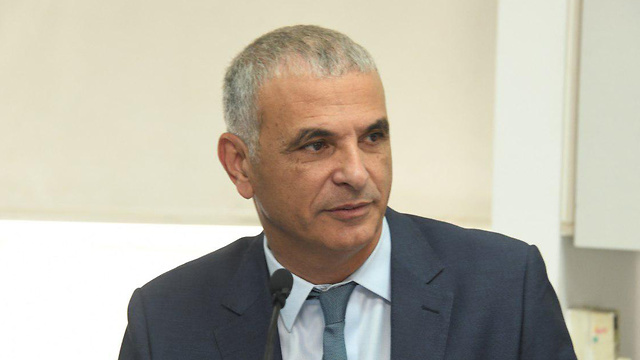
FM Moshe Kahlon

Stop-gap measures not enough to curb Israel's budget deficit
Raising taxes or cutting spending is unlikely during an interim government with limited powers; FM to propose some stop-gap measures, including capping tax breaks on luxury hybrid and plug-in cars, taxing fuel substitutes; budget deficit forecast for 2020: 3.8% of GDP, way above target of 2.5%
Israel's Finance Ministry proposed some temporary fixes on Thursday to curb the country's budget deficit, but said its hands are tied in taking stronger action that is needed until a permanent government is in place.
For months Israel has been facing calls from its own central bank and organizations like the International Monetary Fund to tether spending and raise taxes after it loosened fiscal policy for a few years.
It surprisingly met its deficit target of 2.9% of gross domestic product last year, leading many economists to question whether the government was only able to do so at the expense of 2019's figures.
The opportunity to significantly raise taxes or cut spending was lost after Prime Minister Benjamin Netanyahu failed to form a new coalition following an election in April, something that has never happened before. He now leads a caretaker government with limited powers and a second ballot is due in September.
"Since we have an interim government and parliament was dispersed our ability to narrow the gaps and return to the budget framework we had initially forecast is almost impossible," a senior Finance Ministry official said.
The ministry said it will propose to the cabinet next week some stop-gap measures, including capping tax breaks on luxury hybrid and plug-in cars and taxing certain fuel substitutes, to at least partly rein in the deficit.
Even so, it now forecasts a budget deficit of 3.8% of gross domestic product in 2020 and in 2021, up from a previous estimate of 3.7% for both years. Both are way above a budget target of 2.5% in 2020 and 2.25% in 2021 mandated by law.
The ministry did not revise its deficit target of 3.6% of GDP for 2019.
Based on current commitments, expenditures next year are expected to reach 421 billion shekels, 9 billion above a legal ceiling.
Without the proposed steps, which are expected to narrow the deficit by 3.25 billion shekels ($905 million) in 2020, the deficit would reach 4% of GDP in each of the coming two years.
The Finance Ministry also gave a growth forecast of 3.1% for 2019 and 3.2% for 2020, similar to the OECD's estimate. The Bank of Israel and IMF estimate growth of 3.2% this year.
The ministry expects inflation in 2019 of 1.5%, above a previous forecast of 1.1%, but within the government's 1%-3% target range. ($1 = 3.5906 shekels)


















